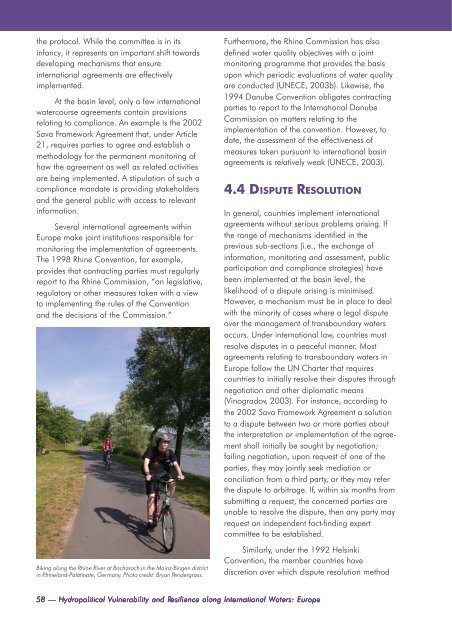Europe - UNEP
Europe - UNEP
Europe - UNEP
You also want an ePaper? Increase the reach of your titles
YUMPU automatically turns print PDFs into web optimized ePapers that Google loves.
the protocol. While the committee is in its<br />
infancy, it represents an important shift towards<br />
developing mechanisms that ensure<br />
international agreements are effectively<br />
implemented.<br />
At the basin level, only a few international<br />
watercourse agreements contain provisions<br />
relating to compliance. An example is the 2002<br />
Sava Framework Agreement that, under Article<br />
21, requires parties to agree and establish a<br />
methodology for the permanent monitoring of<br />
how the agreement as well as related activities<br />
are being implemented. A stipulation of such a<br />
compliance mandate is providing stakeholders<br />
and the general public with access to relevant<br />
information.<br />
Several international agreements within<br />
<strong>Europe</strong> make joint institutions responsible for<br />
monitoring the implementation of agreements.<br />
The 1998 Rhine Convention, for example,<br />
provides that contracting parties must regularly<br />
report to the Rhine Commission, “on legislative,<br />
regulatory or other measures taken with a view<br />
to implementing the rules of the Convention<br />
and the decisions of the Commission.”<br />
Biking along the Rhine River at Bacharach in the Mainz-Bingen district<br />
in Rhineland-Palatinate, Germany. Photo credit: Bryan Pendergrass.<br />
Furthermore, the Rhine Commission has also<br />
defined water quality objectives with a joint<br />
monitoring programme that provides the basis<br />
upon which periodic evaluations of water quality<br />
are conducted (UNECE, 2003b). Likewise, the<br />
1994 Danube Convention obligates contracting<br />
parties to report to the International Danube<br />
Commission on matters relating to the<br />
implementation of the convention. However, to<br />
date, the assessment of the effectiveness of<br />
measures taken pursuant to international basin<br />
agreements is relatively weak (UNECE, 2003).<br />
4.4 DISPUTE RESOLUTION<br />
In general, countries implement international<br />
agreements without serious problems arising. If<br />
the range of mechanisms identified in the<br />
previous sub-sections (i.e., the exchange of<br />
information, monitoring and assessment, public<br />
participation and compliance strategies) have<br />
been implemented at the basin level, the<br />
likelihood of a dispute arising is minimised.<br />
However, a mechanism must be in place to deal<br />
with the minority of cases where a legal dispute<br />
over the management of transboundary waters<br />
occurs. Under international law, countries must<br />
resolve disputes in a peaceful manner. Most<br />
agreements relating to transboundary waters in<br />
<strong>Europe</strong> follow the UN Charter that requires<br />
countries to initially resolve their disputes through<br />
negotiation and other diplomatic means<br />
(Vinogradov, 2003). For instance, according to<br />
the 2002 Sava Framework Agreement a solution<br />
to a dispute between two or more parties about<br />
the interpretation or implementation of the agreement<br />
shall initially be sought by negotiation;<br />
failing negotiation, upon request of one of the<br />
parties, they may jointly seek mediation or<br />
conciliation from a third party, or they may refer<br />
the dispute to arbitrage. If, within six months from<br />
submitting a request, the concerned parties are<br />
unable to resolve the dispute, then any party may<br />
request an independent fact-finding expert<br />
committee to be established.<br />
Similarly, under the 1992 Helsinki<br />
Convention, the member countries have<br />
discretion over which dispute resolution method<br />
58 — Hydropolitical Vulnerability and Resilience along International Waters: <strong>Europe</strong>
















